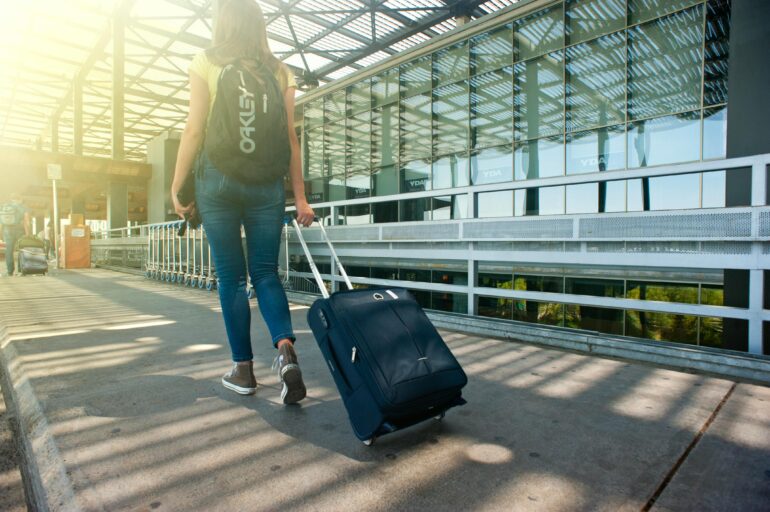More than 7 million people in Spain suffer from digestive motility disorders. Constipation is one of the most frequent problems, affecting between 20-25% of the population, especially women and people over 65 years of age. Constipation, as we have said previously, is a very common health problem. It consists of a decrease in the number of times a person defecates, it is usually less than 3 times a week or it is simply difficult for them to defecate.
When we are on vacation or on a trip, the most normal thing is that the routine that we usually have is broken, that helps us to disconnect, yes, but on the other hand it has a negative point, and that is that it causes bodily imbalances. Changes in diet, changes in the pace of life, changes in sleeping hours, all of this can lead to constipation. In the following article we will tell you how to combat constipation during travel times.
Causes of constipation while traveling
- Changes in diet: It is the most common reason for suffering from constipation, since the body receives new habits regarding food, such as, for example, trying more exotic dishes than normal, due to the travel destination. Another change that can affect the intestines and therefore lead to constipation is the change in the time at which you eat. The whole thing causes an alteration in the stomach, and everything leads to constipation or difficulty when defecating.
- Stress: Stress can influence our intestinal health, altering the intestinal microbiota . This alteration can affect gastrointestinal motility and trigger constipation. We can say that our intestines also feel and suffer.
- Changed schedule: when we travel we usually change the hours in which we go to eat or have dinner, or we can travel to places where there is a time change, therefore, we also have other sleep schedules. We add exhaustion and disorientation regarding time and alteration of well-being, all of which leads to an alteration in the body and may lead to constipation.
- Change in bowel routine: Studies have shown that a time difference of five to eight hours will cause symptoms that can take two days to two weeks to overcome. If your trip is long-distance, you may need 8 to 10 days for bowel habits, temperature regulation, and hormonal cycles to balance.
How to combat constipation on trips and vacations
- Avoid eating large quantities: we know that when we are on vacation our diet changes completely, so, if we do not want to find ourselves in the situation of being constipated, it will be better that we eat a balanced, light diet, so as not to overwhelm our intestines. Eat vegetables, legumes, meat, fish.
- Practice physical exercise: Performing physical activity is ideal for our body, since it activates it and is one of the best tools to combat constipation. In summer, perhaps it is more lazy to go to the gym, but it is not the only option that exists, there are walks on the beach, running or even playing paddles.
- Regular eating schedule: having a mealtime routine helps the body better prepare to correctly assimilate the food ingested. Therefore, we ensure that our body is not altered and defecations can be more regular.
- Consume fiber: it is very difficult to follow a strict diet during the holidays. However, in order to avoid constipation, it is recommended to consume foods rich in fiber that promote intestinal transit. These include cereals, whole grain bread and pasta, legumes, nuts, vegetables and fruit.
- Hydrate well: liquids are the main ally of intestinal transit. Therefore, it is recommended to drink at least one and a half liters of water a day, especially in the months of high temperatures.
- Avoid alcohol or caffeine: both are diuretic drinks, so consuming too much of them can cause dehydration and increase the risk of constipation.
- Avoid stress: there are a large number of people who, simply by thinking about having to defecate in a place other than their home, cause stress and anxiety to appear in them. The only thing that causes this is that they have more difficulties when going to the bathroom, therefore, it’s time to relax and not get nervous.
- Get enough rest: Sleeping well can have a direct impact on the digestive system. It can help us to have a more normal functioning of the digestive system and therefore constipation does not appear.
The importance of probiotics in travel constipation
For constipation it is important to maintain a balanced microbiota to reduce gas in the intestines and facilitate transit. Thanks to certain bacterial strains present in probiotics , the intestine regains good mobility due to the presence of good bacteria that colonize it and allow for better absorption of nutrients and easy disposal of remains.
At Vitae we care about your health and that is why we try to offer the best of us, providing valuable ideas for your daily life. Our proposal is the following:
IntestVita Transit is a natural food supplement that helps promote digestion, facilitate intestinal transit, normal intestinal function and regenerate beneficial intestinal flora. It is formulated based on:
- Mixture of bacteria: ( Lactobacillus gasseri ks-13, Bifidobacterium bifidum G9-1, Bifidobacterium longum MM-2 ) that improve the balance of the microbiota and generate postbiotics .
- Digestive enzymes: (protease, lipase, amylase, lactase) that improve digestive capacity in the short term.
- Orange fiber : hydrolyzed with a probiotic effect , it increases motility and the size of the fecal bolus, favoring defecation.
- Sea buckthorn : contributes to the functionality of the intestinal mucosa and has a regenerative effect on the mucous membranes.
- FOS : improves the growth atmosphere of the microbiota and increases the frequency of pristaltic movements .
We always recommend that any time you feel unwell or feel that certain symptoms are unusual, you go to your doctor.




